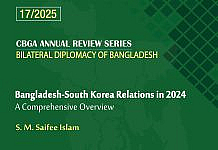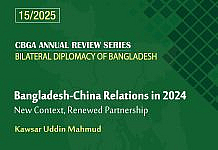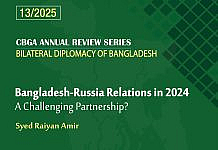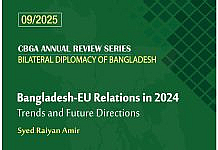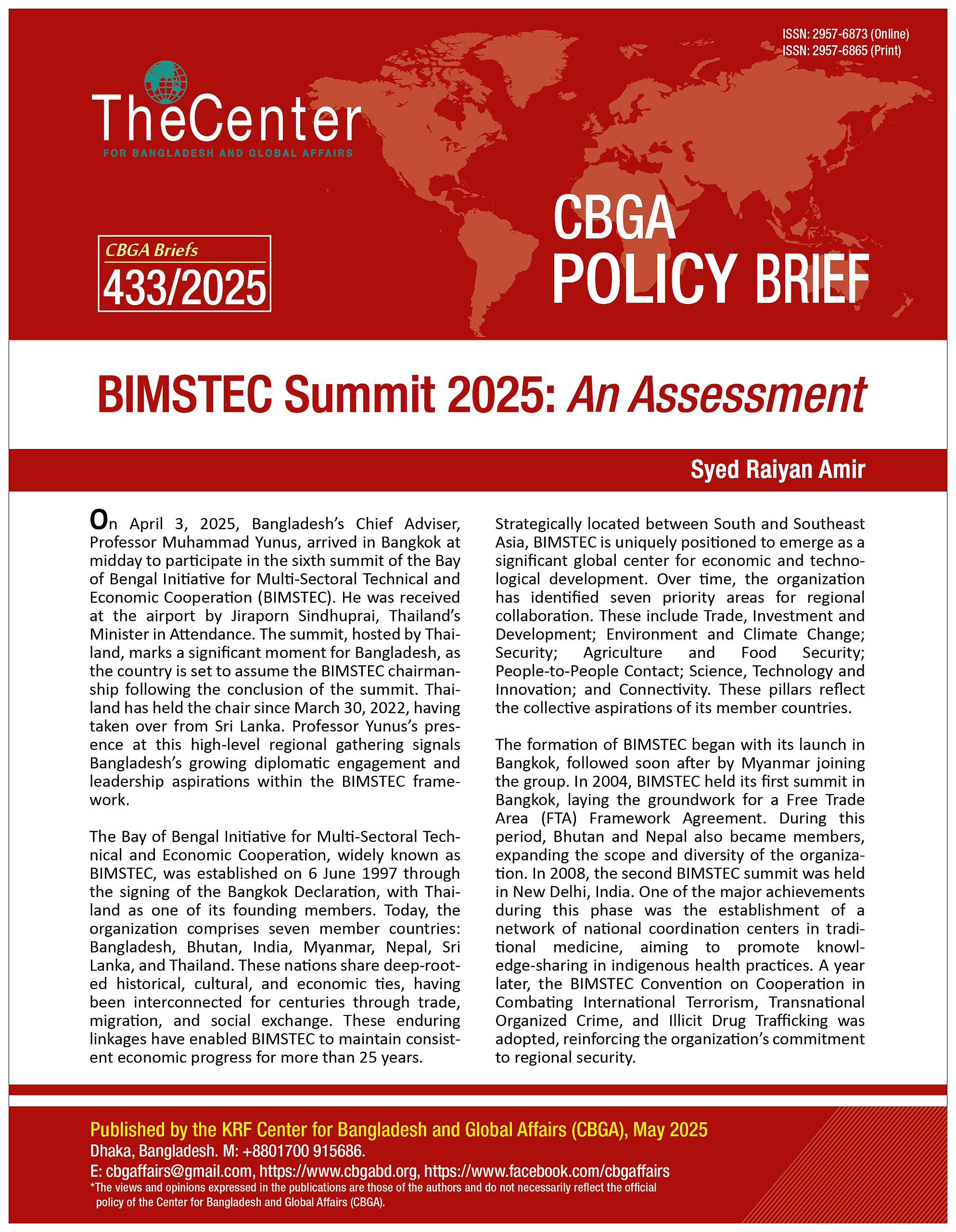
On April 3, 2025, Bangladesh’s Chief Adviser, Professor Muhammad Yunus, arrived in Bangkok at midday to participate in the sixth summit of the Bay of Bengal Initiative for Multi-Sectoral Technical and Economic Cooperation (BIMSTEC). He was received at the airport by Jiraporn Sindhuprai, Thailand’s Minister in Attendance. The summit, hosted by Thailand, marks a significant moment for Bangladesh, as the country is set to assume the BIMSTEC chairmanship following the conclusion of the summit. Thailand has held the chair since March 30, 2022, having taken over from Sri Lanka. Professor Yunus’s presence at this high-level regional gathering signals Bangladesh’s growing diplomatic engagement and leadership aspirations within the BIMSTEC framework.
The Bay of Bengal Initiative for Multi-Sectoral Technical and Economic Cooperation, widely known as BIMSTEC, was established on 6 June 1997 through the signing of the Bangkok Declaration, with Thailand as one of its founding members. Today, the organization comprises seven member countries: Bangladesh, Bhutan, India, Myanmar, Nepal, Sri Lanka, and Thailand. These nations share deep-rooted historical, cultural, and economic ties, having been interconnected for centuries through trade, migration, and social exchange. These enduring linkages have enabled BIMSTEC to maintain consistent economic progress for more than 25 years.
Strategically located between South and Southeast Asia, BIMSTEC is uniquely positioned to emerge as a significant global center for economic and technological development. Over time, the organization has identified seven priority areas for regional collaboration. These include Trade, Investment and Development; Environment and Climate Change; Security; Agriculture and Food Security; People-to-People Contact; Science, Technology and Innovation; and Connectivity. These pillars reflect the collective aspirations of its member countries.
The formation of BIMSTEC began with its launch in Bangkok, followed soon after by Myanmar joining the group. In 2004, BIMSTEC held its first summit in Bangkok, laying the groundwork for a Free Trade Area (FTA) Framework Agreement. During this period, Bhutan and Nepal also became members, expanding the scope and diversity of the organization. In 2008, the second BIMSTEC summit was held in New Delhi, India. One of the major achievements during this phase was the establishment of a network of national coordination centers in traditional medicine, aiming to promote knowledge-sharing in indigenous health practices. A year later, the BIMSTEC Convention on Cooperation in Combating International Terrorism, Transnational Organized Crime, and Illicit Drug Trafficking was adopted, reinforcing the organization’s commitment to regional security.
The third summit was hosted in Nay Pyi Taw, Myanmar, in 2014. One of the defining outcomes of this gathering was the establishment of the BIMSTEC Secretariat in Dhaka, Bangladesh. This permanent institution has since played a key role in streamlining communication, coordination, and implementation of BIMSTEC initiatives.
In 2018, the fourth summit was held in Kathmandu, Nepal. During this event, the member states signed a Memorandum of Understanding (MoU) on the establishment of the BIMSTEC Grid Interconnection. This was a milestone agreement focused on promoting energy cooperation through cross-border electricity exchange and infrastructure development.
The fifth BIMSTEC Summit took place in Colombo, Sri Lanka, in 2022. Several crucial agreements were finalized, including the formal adoption of the BIMSTEC Charter, which provides a legal and institutional foundation for the organization. Alongside this, the Master Plan for Transport Connectivity was unveiled to improve infrastructure and mobility across member states. Additionally, the Convention on Mutual Legal Assistance in Criminal Matters was introduced to foster greater collaboration in criminal justice. Another important step was the signing of a Memorandum of Association for the establishment of a Technology Transfer Facility (TTF), aimed at encouraging innovation and technological progress within the region. Furthermore, BIMSTEC streamlined its focus areas from fourteen down to seven, ensuring a more concentrated and strategic approach.
BIMSTEC Summit 2025: Key Outcomes and Future Prospects
The Sixth BIMSTEC Summit concluded on 4 April 2025 in Bangkok, marking a significant step in the ongoing efforts to strengthen regional cooperation among the Bay of Bengal Initiative for Multi-Sectoral Technical and Economic Cooperation (BIMSTEC) countries. Thailand, which has been a host to the BIMSTEC Summit since its inception in 2004, has once again served as the venue for this year’s gathering, where the focus was on furthering economic and cultural integration.
Key Outcomes of the Summit
The summit’s theme, “Prosperous, Resilient, and Open BIMSTEC,” reflects the shared ambitions of the seven member states—Bangladesh, Bhutan, India, Myanmar, Nepal, Sri Lanka, and Thailand—to overcome regional challenges and deepen their collective efforts. Several key documents were approved by the leaders, laying out a clear framework for the future of the group.
BIMSTEC Bangkok Vision 2030
The first-ever long-term strategic vision for BIMSTEC, the Bangkok Vision 2030, sets out a roadmap to guide regional cooperation until 2030. The vision emphasizes economic integration, human security, and improved connectivity among the member states.
6th BIMSTEC Summit Declaration
The leaders reaffirmed their commitment to the goals and objectives of BIMSTEC, underscoring their dedication to the implementation of the Bangkok Vision 2030.
Rules of Procedure for BIMSTEC Mechanisms
A set of procedural rules was established to ensure that BIMSTEC functions efficiently and in a more systematic manner, providing a clearer structure for decision-making and cooperation.
Report of the Eminent Persons’ Group
The report offers recommendations for the future direction of BIMSTEC, aligning with the broader goals of the Vision 2030 and focusing on areas such as trade, connectivity, and regional cooperation.
Agreement on Maritime Transport Cooperation
A key achievement of the summit, this agreement aims to strengthen maritime connectivity between South and Southeast Asia, reducing trade costs and improving the movement of goods and people.
Joint Statement on the Earthquake Impact in Myanmar and Thailand
A collective statement expressing condolences and solidarity for the countries affected by recent earthquakes, with a commitment to enhancing disaster management and response mechanisms in the region.
Regional Benefits and National Implications
The summit’s outcomes are expected to bring tangible benefits to the participating countries. For Thailand, the Agreement on Maritime Transport Cooperation is particularly significant. It is anticipated that the agreement will lower shipping costs, enhance supply chain efficiency, and make Thai exports more competitive in the regional market. Additionally, the emphasis on people-to-people exchanges and cultural cooperation is expected to boost Thailand’s tourism sector and generate new job opportunities.
Bilateral Engagements on the Sidelines
In addition to the formal summit discussions, Thailand hosted bilateral visits from Nepalese Prime Minister K.P. Sharma Oli and Indian Prime Minister Narendra Modi. Prime Minister Oli’s visit was the first by a Nepali head of state to Thailand, with discussions focused on trade, agriculture, tourism, and cultural exchange. A total of eight agreements and MoUs were signed during the visit.
Meanwhile, Prime Minister Modi’s visit marked the elevation of India-Thailand relations to a Strategic Partnership, with both countries agreeing to enhance cooperation in several areas, including defense, trade, and connectivity. The two leaders also discussed the development of a joint Buddhist Circuit and exchanged views on regional and global issues.
The Transition of Leadership
At the conclusion of the summit, Thailand officially handed over the BIMSTEC chairmanship to Bangladesh, marking a new chapter in the organization’s leadership. Prime Minister Paetongtarn Shinawatra expressed confidence that Bangladesh will continue to advance the initiatives discussed at the summit. As Bangladesh prepares to take over as chair, the summit’s outcomes provide a solid foundation for future regional cooperation. The implementation of the BIMSTEC Bangkok Vision 2030 will be key to ensuring that the momentum generated at the summit translates into measurable progress for the region.
The summit, coming three years after the fifth meeting in Sri Lanka, reflects the evolving dynamics of BIMSTEC. Despite the challenges posed by political tensions and varying levels of commitment from member countries, the summit highlighted the potential for deeper integration, particularly in the areas of trade, connectivity, and disaster management. As the region moves forward, the next steps will be crucial in realizing the long-term goals set out by the Vision 2030.
In the conclusion, as the region stands at a crossroads, BIMSTEC’s way forward must emphasize pragmatic cooperation over political divergence. Member states should prioritize the institutionalization of mechanisms like Single Window systems and multimodal transport corridors that offer low-hanging fruits with high regional returns. The Bangkok Vision 2030 must be translated into actionable targets with measurable outcomes. Regular ministerial-level monitoring, stakeholder consultations, and civil society engagement can help maintain momentum and public support.
In an increasingly polarized global environment where trade wars and power rivalries threaten established norms, regional groupings like BIMSTEC offer a vital alternative route to economic security and political stability. By focusing on shared interests—such as connectivity, disaster management, energy cooperation, and digital transformation—BIMSTEC can evolve into a cornerstone of South and Southeast Asian regionalism.
While the sixth BIMSTEC Summit laid the groundwork for a reinvigorated organization, its future success hinges on the political maturity, economic pragmatism, and sustained commitment of its member states. If these ingredients can be mobilized effectively, BIMSTEC has the potential to emerge not only as a platform for dialogue but as a dynamic engine of growth, cooperation, and resilience in the Indo-Pacific century.
– Syed Raiyan Amir is a Senior Research Associate at the KRF Center for Bangladesh and Global Affairs (CBGA).



